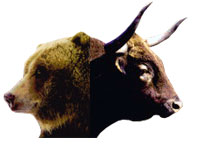Bulls & Bears
![]()
When experts are discussing the stock market, they often use the terms "bull market" and "bear market." Why do they use a bull and a bear? Would you believe that no one is really sure? Still, there are two common explanations.
1. The Proverb
There’s a proverb “Don’t sell the bearskin before you’ve caught the bear.” That proverb probably came from this story:
 Back in the day of hunting bears and selling their skins, the middlemen that were involved in the sale of bearskins would sell skins that they had not yet received. This means that they would speculate about the future purchase price of these skins from the trappers in hopes of a decrease in their purchase price and an increase in personal profits due to a spread.
Back in the day of hunting bears and selling their skins, the middlemen that were involved in the sale of bearskins would sell skins that they had not yet received. This means that they would speculate about the future purchase price of these skins from the trappers in hopes of a decrease in their purchase price and an increase in personal profits due to a spread.
These middlemen became known as “bears,” short for “bearskin jobbers.” The term stuck for describing a decrease in the market (just as these middlemen wished for the price of the bearskins to drop).
Finally, since bears and bulls were widely considered to be opposites due to the popular sport of bulls fighting bears, the term “bull” was used as the opposite to “bears.”
2. The Method of Attack
The terms “bear” and “bull” come from the methods in which each animal attacks its opponents. For example, a bull will thrust its horns up into the air, and a bear will swipe down. This action was related to the movement of a market. If the trend was up, then it was a considered a bull market; if the trend was down, then it was considered a bear market.
In investment terms, here’s how we define a bear and a bull:
Bear – Stock market “bears” are investors who expect prices to fall, so they sell stock they don’t own yet. The bears are gambling on the hope that the price will fall by the time they actually have to buy the stock and deliver it to their buyers. This action is called “selling short,” and the bears hope to make lots of money by doing this.
Bull – Stock market “bulls” are investors who expect prices to rise, so they purchase a security or commodity in hopes of reselling it later for a profit. A bullish market is one in which prices are generally expected to rise.